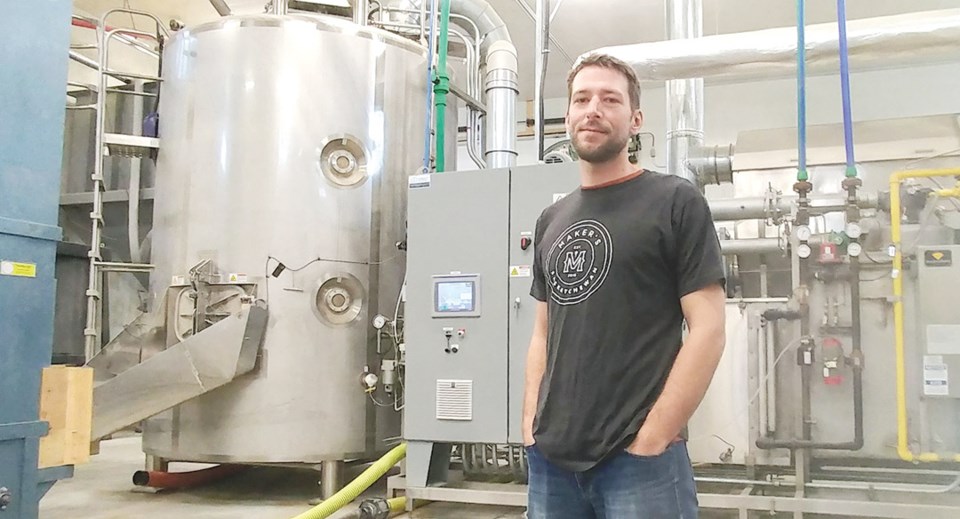You might recall Steven Maier as a Yorkton-born musician with time spent in bands such as Sexually Attracted to Fire and Crestwood.
But there comes a time for many musicians when the lure of a regular job takes them in a different direction.
And so we catch up with Maier today as he takes on the role of maltster with Makers Malt.
But what exactly is a maltster?
“A maltster takes barley grains and turns them into malted barley, one of the primary ingredients in beer and spirits,” explained Maier. “We germinate the grains, which makes starch that is otherwise inaccessible, available to the brewer.
“It also creates enzymes which, when ‘mashed’ by the brewer, creates sugar from the starch and is where the alcohol in beer and spirits comes from.
“We stop the germination process by drying the barley and applying heat at a point that maximizes the starch and enzyme content. By applying different levels of heat during the drying process, we can create different coloured malt, which is the difference between a light golden lager, an inky black stout, and every beer style in between.
“Malted barley provides the colour for beer, and contributes a large part of the flavour in a beer.”
As interesting as the job might sound, it is not an usual career choice for someone who grew up near Yorkton, with a guitar in his hands.
“My interest in the craft beverage industry started in 2012 when I began working for a craft brewery in Saskatoon,” Maier explained. “I started as a delivery person and over three-years working for the company worked my way up to brewer.”
The beer bug had bitten Maier.
“I built a 10 gallon brewing system out of old beer kegs and started home brewing my own beer, cider, and mead at that time.
“When I quit brewing I was still playing music and working odd jobs to pay the bills.”
As chance has it, the need to pay bills put him back to his roots.
“One of my jobs was working for a farmer, helping with harvest for a couple of seasons, and I learned a lot about barley,” he said. “Saskatchewan is known for growing some of the best malting barley in the world. A percentage of the crop stays in Saskatchewan, but often it is sent to be malted in other provinces and malting facilities around the world, and in some cases it travels back to Saskatchewan to be made into beer.
“I grew up on a farm outside of Yorkton and finding a way to marry farming and beer really interested me.”
So in 2016, Maier said he “took a malting barley course at the Canadian Malt Barley Technical Centre in Winnipeg, and dreamed of opening my own maltery.”
That dream would open a door for Maier.
“I met Matt Enns in 2018, who had just opened the first craft malting facility in Saskatchewan, and he was looking for a maltster,” he said.
“After a few interviews and a few beers, I was hired on to help the small company produce malt and handle the day to day operations of the plant.
“Being the first facility of our kind in the province presents daily challenges and we are constantly learning and finding new ways to improve our product.”
So what exactly is Makers Malt?
“Makers Malt was started in late 2017 by a small collective of farmers with years of experience growing malted barley in the heart of the Saskatchewan Valley, north of Saskatoon,” explained Maier. “Typically, barley is graded as either malt quality or feed quality. If barley makes the grade, it is sent to the grain elevator or directly to large-scale malting plants where it is mixed with other farm’s barley and malt.
“Of all the barley we grow on the farm that makes the malt grade, less than 10 per cent makes it to our malt house. This allows us to pick the very best malting barley from the farm, providing an extremely high-quality and consistent end product.
“Currently, we are malting barley grown less than two miles from the malting facility.”
The new company is looking to create a niche in the malt market place.
“We are the first craft maltery in Saskatchewan and one of only two malt plants in the province,” said Maier. “Unlike Prairie Malt in Biggar, who malt on a large scale for traditional commercial breweries, we focus on small batch production, creating malts with robust flavour, focusing on the needs of the booming craft beer industry.
“We are able to take specifications provided by the craft brewer and provide a tailor made product that suits the variety of beers they want to produce.”
The customization of the malt opens doors in terms of creating sales.
“Our malt has been sold from Alberta to Ontario, though the vast majority of what we produce is sold to craft breweries and distilleries in Saskatchewan,” said Maier. “If you drink Saskatchewan made craft beer or spirits, there is a good chance you’ve already tasted our product. The Saskatchewan craft beverage industry is a close-knit community of hard-working, creative people, and we are proud to be a part of it.”



